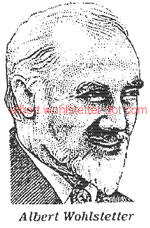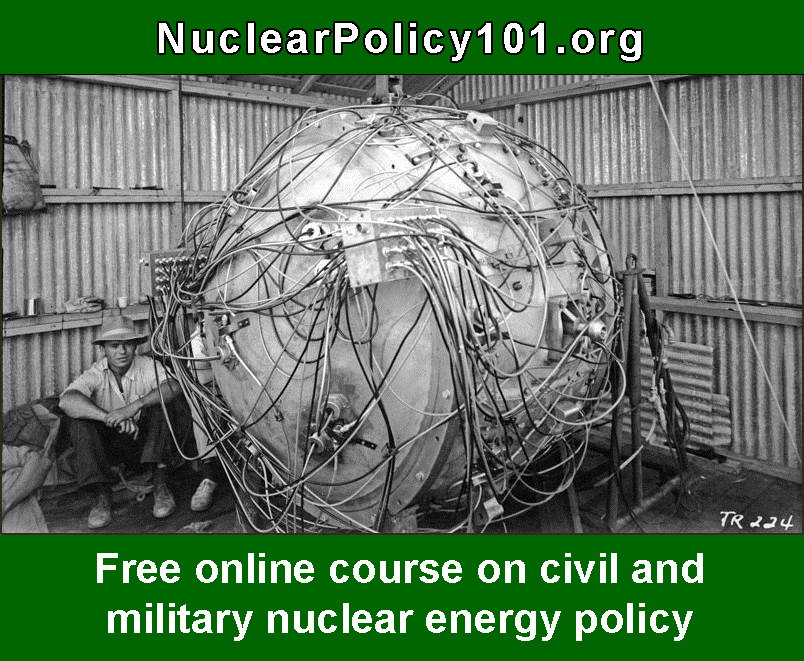 This latest installment provides a partial list of Albert Wohlstetter’s published (and a few unpublished) writings from 1980 to 1989.
This latest installment provides a partial list of Albert Wohlstetter’s published (and a few unpublished) writings from 1980 to 1989.
The 1980s marked Wohlstetter’s fourth decade in the field of nuclear-age strategy. Although he had already passed the age of retirement (December 1980 marked his 67th birthday), he nonetheless chose to remain active throughout the decade both as an outside adviser to decision-makers in the US government and as a public intellectual of national security affairs.
Wohlstetter, in his capacity as a public intellectual, continued to stake out controversial positions in fierce national debates over the direction of America’s nuclear and non-nuclear strategy. In particular, in the pages of Commentary he critiqued the logic and conclusions of the American Catholic bishops’ 1983 pastoral letter on war and peace in the nuclear age; and in the pages of Foreign Affairs and The National Interest he sparred with opponents of qualitative improvements to America’s nuclear arsenal and delivery vehicles.
Moreover, in his capacity as an outside adviser to the US government, Wohlstetter not only made contributions in policy analysis to, but also was honored by, the Reagan administration.
To begin with, early in the decade he and his colleagues at PAN Heuristics completed a series of studies on various Persian Gulf contingencies for the US Department of Defense. One contingency that these 1980/1981 studies considered was of an invasion of Kuwait by Ba’athist Iraq.
In November 1985 both Albert and Roberta Wohlstetter were awarded by President Ronald Reagan the Medal of Freedom, America’s highest civilian honor. (During the same award ceremony, Reagan also awarded the Medal of Freedom to Paul H. Nitze.)
And in the mid-to-late 1980s, Albert and Fred C. Iklé (who at the time was the Undersecretary of Defense for Policy) co-chaired the Commission on Integrated Long-Term Strategy (CILTS), the mandate of which was to reassess America’s approach to foreign policy and propose “adjustments to US military strategy in view of a changing security environment in the decades ahead.”
The membership of Commission drew from a wide range of bipartisan expertise:
- Anne L. Armstrong, former US ambassador to Britain;
- Zbigniew Brzezinski, Carter’s National Security Advisor;
- William P. Clark, Reagan’s deputy defense secretary and later National Security Advisor;
- W. Graham Claytor, Jr., Carter’s Navy secretary and later Deputy Secretary of Defense;
- GEN Andrew J. Goodpaster (ret.), Eisenhower’s staff secretary and later Supreme Allied Commander, Europe (SACEUR) under Nixon;
- ADM James L. Holloway, III (ret.), former Chief of Naval Operations;
- Samuel P. Huntington, Harvard political scientist;
- Henry A. Kissinger, Nixon and Ford’s Secretary of State;
- Joshua Lederberg, Nobel prize-winning biologist;
- GEN Bernard A. Schriever (ret.), US Air Force proponent of space and ballistic missile research; and
- GEN John W. Vessey (ret.), former chairman of the Joint Chiefs of Staff.
The Commission’s final report, Discriminate Deterrence, was released in January 1988, and was received in the US and Western Europe with a mixture of support and opposition.
Albert Wohlstetter’s Writings (1980-1989)
- Albert Wohlstetter, “Half Wars and Half Policies in the Persian Gulf,” in W. Scott Thompson, ed., National Security in the 1980s: From Weakness to Strength
(Washington, DC: Institute of Contemporary Studies, 1980).
- Albert Wohlstetter, “Meeting the Threat in the Persian Gulf,” Survey, Vol. 25, No. 2 (Spring 1980), pp. 128-188.
- Albert Wohlstetter, “Les États-Unis et la sécurité du Golfe,” Politique Étrangére, Vol. 46, No. 1 (March 1981), pp. 75-88.
- Albert and Roberta Wohlstetter, Responding to Ambiguous Signals of Soviet Imminent or Future Power Projection, Vol. 1: Overview, draft final report in partial fulfillment of DNA001-80-C-0369, PH-82-5-0369-67-I (Marina del Rey, CA: PAN Heuristics, May 1982).
- Albert Wohlstetter, “Nuclear Policies Clarified,” letter to the editor, Air University Review, September-October 1982.
- Albert Wohlstetter, “A Prescription for Disjointed Defense,” opinion, Wall Street Journal March 16, 1983, p. 30.
- Albert Wohlstetter, “Bishops, Statesmen, and Other Strategists on the Bombing of Innocents,” Commentary, Vol. 75, No. 6 (June 1983), pp. 15-35. Reprinted in Robert Zarate and Henry Sokolski, eds., Nuclear Heuristics: Selected Writings of Albert and Roberta Wohlstetter (Strategic Studies Institute, 2009).
- Albert Wohlstetter, et al., “Morality and Deterrence: Albert Wohlstetter responds to…,” Commentary, Vol. 76, No. 69 December 1983), pp. 4-22.
- Albert Wohlstetter and Nancy Virts, “Armenian Terror as a Special Case of International Terror,” in International Terrorism and the Drug Connection (Ankara, Turkey: Ankara University Press, 1984), pp. 261-280.
- Albert Wohlstetter, “‘Nuclear Temptations’: An Exchange,” New York Review of Books, Vol. 31, No. 9 (May 31, 1984).
- Albert Wohlstetter, “Foreword,” in S. Enders Wimbush, ed., Soviet Nationalities in Strategic Perspective
( New York, NY: St. Martin’s Press, 1985), pp. ix-xii.
- Albert Wohlstetter, “Between an Unfree World and None: Increasing Our Choices,” Foreign Affairs, Vol. 63, No. 5 (Summer 1985), pp. 962-994.
- Albert and Roberta Wohlstetter, “On Arms Control: What We Should Look for in an Arms Agreement,” unpublished draft essay, May 20, 1985, available from the Hoover Institution Archive, Albert and Roberta Wohlstetter Papers, Notes, Box 118, Folder 16. Published for the first time in Robert Zarate and Henry Sokolski, eds., Nuclear Heuristics: Selected Writings of Albert and Roberta Wohlstetter (Strategic Studies Institute, 2009).
- Albert Wohlstetter and Brian G. Chow, “Arms Control That Could Work,” opinion, Wall Street Journal, July 17, 1985, p. 28. Reprinted in Robert Zarate and Henry Sokolski, eds., Nuclear Heuristics: Selected Writings of Albert and Roberta Wohlstetter (Strategic Studies Institute, 2009).
- Albert and Roberta Wohlstetter, “Remarks at the Presentation Ceremony for the Presidential Medal of Freedom,” The White House, Washington, DC, November 7, 1985. Available online at the Ronald Reagan Presidential Library’s website.
- Albert Wohlstetter, “‘Counsels of War’: An Exchange,” New York Review of Books, Vol. 32, No. 18 (November 21, 1985).
- Albert Wohlstetter and Brian G. Chow, Self-Defense Zones in Space, study for Integrated Long-Term Defense Strategy in partial fulfillment of MDA903-84-c-0325 (Marina del Rey, CA: PAN Heuristics, July 1986). PDF version available online at Albert Wohlstetter Dot Com.
- Albert Wohlstetter, “La minaccia soveitica” (trans. by Francesco Pistolato), MonOperaio, Vol. 9, No. 3 (August-September 1986), pp. 69-76.
- Fred S. Hoffman, Albert Wohlstetter and David S. Yost, ed., Swords and Shields: NATO, the USSR, and New Choices for Long-Range Offense and Defense
(Lexington, MA: Lexington Books, 1987).
- Albert Wohlstetter and Richard Brody, “Continuing Control as a Requirement for Deterring,” in Ashton B. Carter, John D. Steinbruner and Charles A. Zraket, eds., Managing Nuclear Operations
(Washington, DC: Brookings Institution, 1987), pp. 142-196.
- Albert Wohlstetter, “Swords Without Shields,” The National Interest, No. 9 (Summer 1987), pp. 31-57.
- Discriminate Deterrence, report of the Commission on Integrated Long-Term Strategy (Washington, DC: US Government Printing Office, January 1988). Available online at the website of the Defense Technical Information Center’s Scientific and Technical Information Network (STINET). [Fred C. Iklé and Albert Wohlstetter co-chaired the Commission, the members of which were: Anne L. Armstrong, Zbigniew Brzezinski, William P. Clark, W. Graham Claytor, Jr., Andrew J. Goodpaster, James L. Holloway, III, Samuel P. Huntington, Henry A. Kissinger, Joshua Lederberg, Bernard A. Schriever and John W. Vessey.] Excerpt on “Connecting the Elements of the Strategy” reprinted in Robert Zarate and Henry Sokolski, eds., Nuclear Heuristics: Selected Writings of Albert and Roberta Wohlstetter (Strategic Studies Institute, 2009).
- Albert Wohlstetter and Stephen Prowse, “Stability in a World with More than Two Countries,” in Beyond START?, University of California Institute on Global Conflict and Cooperation (IGCC) Policy Paper No. 7 (La Jolla, CA: IGCC, 1988), pp. 46-54.
- Albert Wohlstetter, “Sharing the Risks and Costs of Defending Shared Interests,” testimony before the US House of Representatives’ Committee on Armed Services, hearing on Defense Burdensharing: The Costs, Benefits, and Future of US Alliances (Washington, DC: US Government Printing Office, March 1, 1988), pp. 107-272.
- Albert Wohlstetter, “Overseas Reactions to Discriminate Deterrence,” Atlantic Community Quarterly, Vol. 26, No. 3 (Fall-Winter 1988), pp. 234-269.
- Albert Wohlstetter, “Morning of Prosperity in America: Own Data Misled Stagnation Prophets,” opinion, Wall Street Journal, November 3, 1988, p. A18.
- Albert Wohlstetter, “End of the Cold War? End of History and All War?” [Excerpt from an outline for a memoir, in Albert and Roberta Wohlstetter, Proposal to the Ford Foundation, June 30, 1989 {revised July 10, 1989}, pp. 15-17]. Published for the first time in Robert Zarate and Henry Sokolski, eds., Nuclear Heuristics: Selected Writings of Albert and Roberta Wohlstetter (Strategic Studies Institute, 2009).
- Albert Wohlstetter, “When Empires are Falling, Daring is Prudence,” opinion, Wall Street Journal, December 12, 1989, p. A20. See also correction in “Editor’s Note,” Wall Street Journal, December 14, 1989, p. A23.





